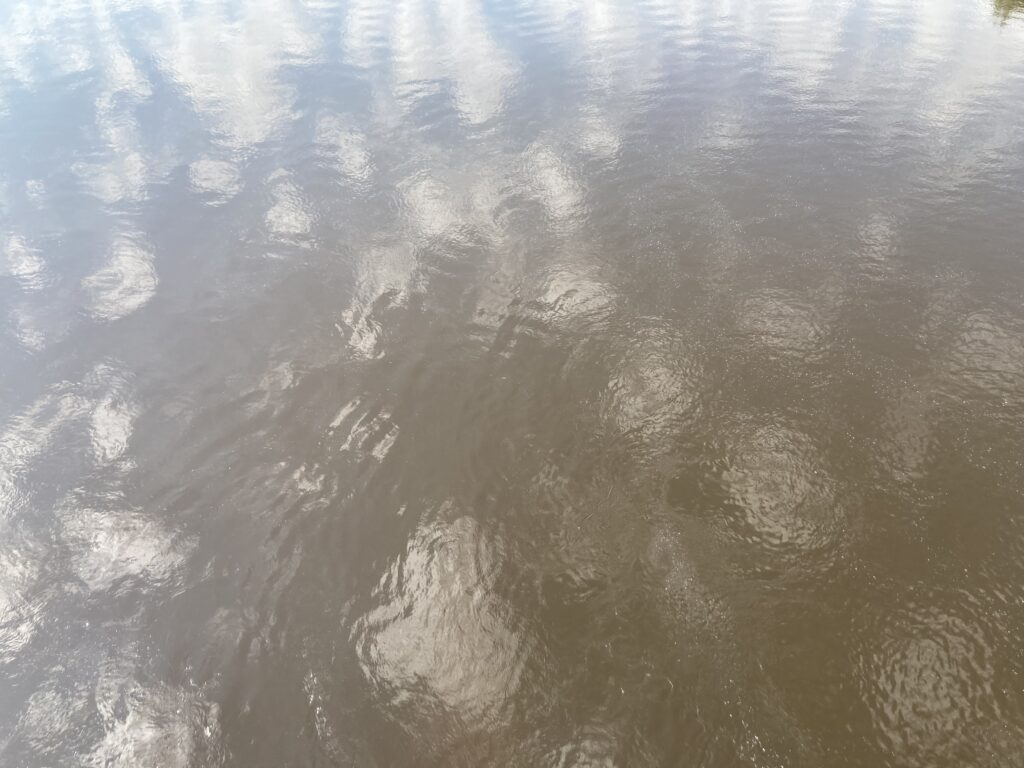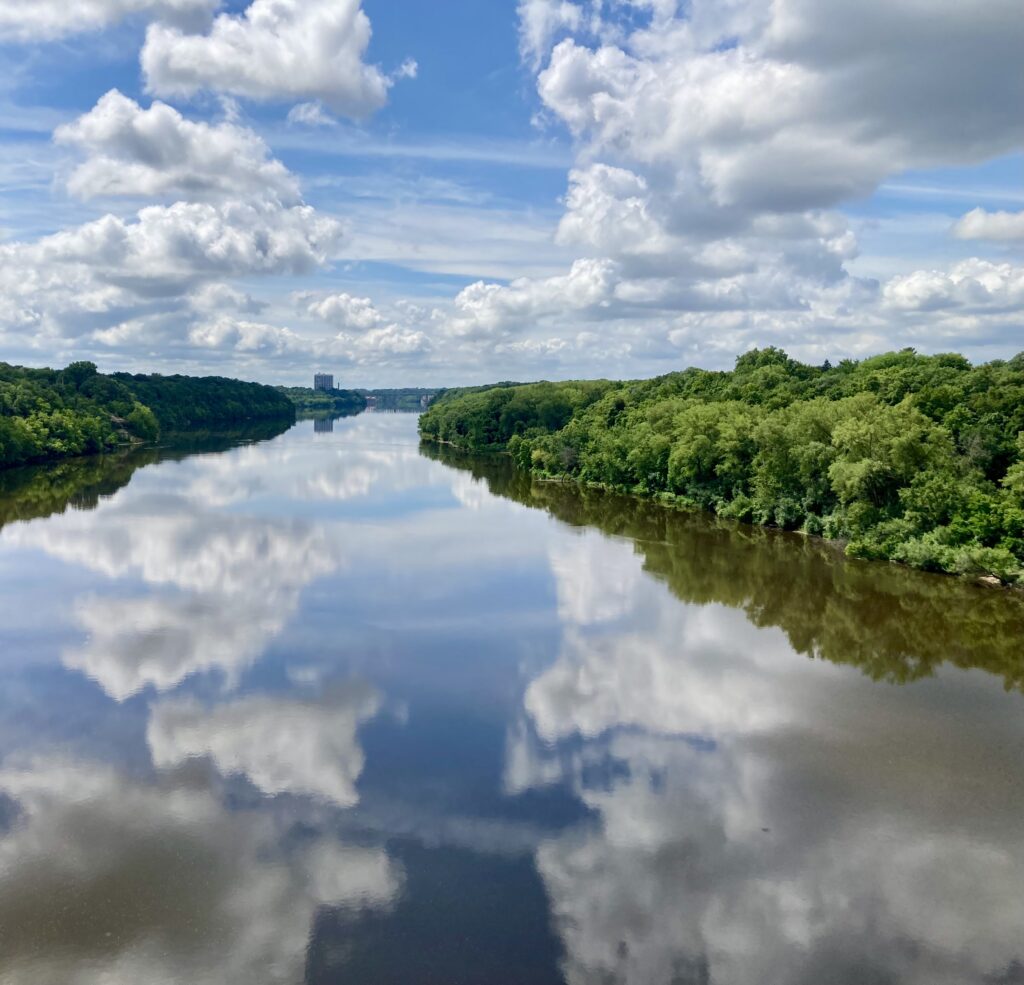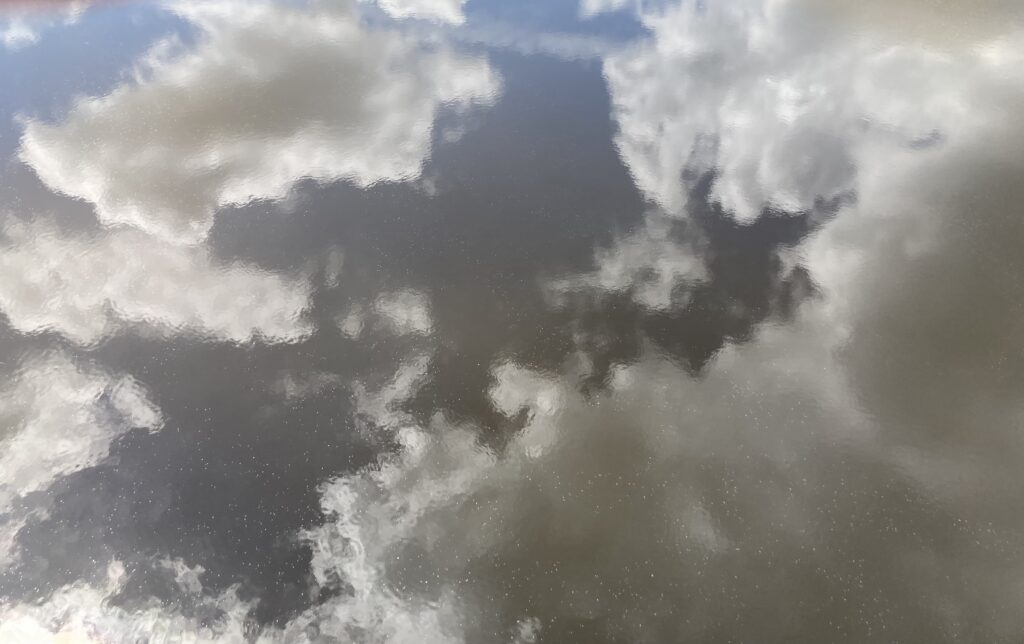Like past Julys, this month was mostly about water, with a few other topics sprinkled in. No singular theme or focus; letting the ideas inspired by my experiences swimming, biking, running, reading to lead me to new thoughts, or return me to old ones. Near the end of the month, I started writing more 5-syllable sonnets (14 lines, each line with 5 syllables) about swimming and created a new form: the inkling.
more vision test poem ideas
1 july
the colorblind plates: The feeling when I took the test was relief and recognition — positive feelings. Later, more mixed feelings. The loss of a language is difficult. But, failing the test is an opportunity to form a new relationship with color. How to represent that? I’m still struggling.
the visual field test: I have taken it 3 times, I think — once when I was first diagnosed, once 3 years later, and just last month. You put your chin on a chin rest, press your forehead up against a bar, and look through a visor. You’re supposed to stare directly at a center dot and click a button when you see flashes in other areas of the visual field. How could I represent that in a poem?
idea: instruct the reader to keep staring into the center at the dot and try to see the words in different parts of the visual field. This one could be a series of “images” of the field with words — electric words, like Saroyan’s eyeye
2 july
What is a field? The visual field is “that portion of space in which objects are visible at the same moment during steady fixation of the gaze in one direction.”
Ruin, erosion, and the rewilding of my vision
4 july
when the dot isn’t visible (to me), I make/imagine/conjure it and rely on rumor
rumor = talk not based on proven knowledge and murmuring noise (bubbles/spirits speaking)
23 july
Field of vision? Suddenly I thought about my interest in writing a poem/s about taking the visual field test (see 1 july 2025). And I’m thinking about landscapes and fields and meadows (see 2 may 2025). A line popped into my head: a meadow of moments — no, a moment meadows.
What does the visual field test have to do with the lake or my experiences swimming in it? A lot, I think. Somehow I want to bring together the visual field test with my swimming and sighting buoys. How? Not sure yet.
24 july
fields, meadows, scenes (not) grasped in a glance — see Forrest Gander and Naomi Cohn
Yesterday, reviewing early july entries, I encountered this definition of visual field: “that portion of space in which objects are visible at the same moment during steady fixation of the gaze in one direction.”
It reminded me of definitions of landscape I came across yesterday in the OED: “A view or prospect of natural inland scenery, such as can be taken in at a glance from one point of view.”
the space in which objects are visible at the same time, what all can be taken in (simultaneously) with one glance
reversed worlds — above and below water — surfaces — beginnings and endings
3 july
- Anne Carson and the anthropology of water — which way is up, which down?
- Wendell Berry: starts with the ground — rooted in place, like other plants/animals — the I/body only brief coherences and articulations
- Arthur Sze — maybe we’re like mycelium with poems as mushrooms and brief bursts of expression
- W Berry and the reversal of wild and domestic — the forest is domestic, creating home spaces, humans are wild, destroying them
7 july

11 july
the beginning of a body of water: I started rereading Argument with the Lake this afternoon — a poetry collection I bought in 2018 — and discovered this description of the origins of a lake. I’ll add it to my growing collection of descriptions — of a river in England (see: 30 aug 2024) and a lake in Germany (see: 2 july 2024).
12 july
Lake Nokomis — its origins and its becoming a body of water the functions like a real lake
How can anyone read about the glacial
creation of lakes and not feel connected
to the Earth–capital E?
(from Exaqua/ Jan-Henry Gray)
What connection can/should/does one feel to the Earth when reading about the creation of a lake through dredging and planning and acquiring land for recreation and development? As a preliminary answer, I’ll offer, there is/can be a meaningful connection; it’s just not the same as with a “natural”/glacial lake.
18 july
The only way to know a song is to sing it.
The only way to know an ocean is to swim it.
(from Across the Pacific Ocean/ Jan-Henry Gray)
These lines are from an earlier poem in the collection, but I’ve been thinking about them and I think they can be put into conversation with EXQUA. I’d also like to put them into conversation with my own thoughts on being in the water as opposed to being near it or beside it or above it (like I am with the river).
I think about all that I know or understand or am familiar with because of the time I’ve been in lake nokomis over the last 12 years. The quality of the water, its currents, its colors, its buoyancy, its temperatures. The sediments, the ducks, seagulls, loons, dragonflies, the vegetation.
In the water, you feel the ripples, the swells, the rocking of the waves, the wind. Out of the water, you might see a textured surface or a whitecap, but you might only see flat, calm water.
22 july
In July, I’m finding myself thinking about how much time I’m spending above the surface versus below it. This year, I’m below much more than above. In past summers, I’ve done less loops and more stops at shore in-between. This year, I might occasionally pause mid-lake for 5-10 seconds, or take a 30 second break at the beach between the 3rd and 4th loop, but mostly I’m swimming freestyle without stopping. 60-90 minutes of 1 2 3 4 5 breathe right 1 2 3 4 5 breathe left. That’s a lot of time submerged and becoming acquainted with the underwater world!
Below, my thoughts are the bubbles that surround me. Above, they become words that hover above the water or travel across the lake — maybe they get lost beyond the horizon, or maybe they linger, later taking the form of words on a page. Last night, swimming the stretch from hidden beach back to point beach, I imagined each breath as one word bursting into the air: 1 2 3 4 5 BLUE 1 2 3 4 5 GRAY
Anne Carson and May Swensen: the world in water as the reverse of land
Alice Oswald: not a reverse, but a doubling that is darker
Darby Nelson and only seeing at the surface, missing most of what’s in the lake
23 july
Landscapes, ecosystems, and understanding the self as more than an I
24 july


I tried something new as a I swam. Each time I tilted my head to breathe, I thought a word, usually 1 syllable but occasionally 2: squish flash flit fly flush flare zip zap bird tree cloud blue girl ghost gorge life death bliss breath bubbles bike run float lift shut jump black red orange feet toe hand face field grass give take spirit sprite light dark
25 july
Anne Carson and the friends I join in the water
reciting Alice Oswald lines
1
Then I jumped in a rush of gold to the head,
through black and cold, red and cold, brown and warm,
giving the water the weight and size of myself in order to imagine it,
water with my bones, water with my mouth and my understanding
(Dart/ Alice Oswald)
2
He dives, he shuts himself in a deep soft-bottomed
silence
which underwater is all nectarine, nacreous. He lifts
the lid and shuts and lifts the lid and shuts and the sky
jumps in and out of the world he loafs in.
Far off and orange in the glow of it he drifts
(Dart/ Alice Oswald)
3
There said to be microscopic insects in the eye
who speak Greek and these invisible
ambassadors of vision never see themselves
but fly at surfaces and back again
with pigment caught in their shivering hair-like receptors
and this is how the weather gets taken to and for
and waves pass each other from one color to the next
(Nobody/ Alice Oswald)
4
About an hour ago she shook her arms out
and peered around and dived again and surfaced
and saw someone and dived again and surfaced
and smelt all those longings of grass-flower smells
and bird-flower sounds and vaporous poems
that hang in the chills above rivers
(Nobody/ Alice Oswald)
5
I wish I was there or there he thinks and his mind
immediately
as if passing its beam through cables
flashes through all that water and lands
less than a second later on the horizon
and someone with a telescope can see his tiny thought-forms
floating on the sea surface wondering what next
(Nobody/ Alice Oswald)
6
like spirits of sight whose work is on the water
where the massless mind undulates the intervening air
shading it blue and thinking
I wish I was there
or there
the language of water
5 july
Reading through this chapter on lakes (in How to Read Water), I’m realizing that you can determine the depth of a lake by surface-level clues — ducks and swans = shallower water / cormorants (have I ever seen a cormorant?) = deeper. Clouds over land are different than clouds over water, so in bigger lakes you can tell if there are islands by looking at the clouds.
7 july
“The colors we see in water depend on the brightness and angle of the light and the water’s depth, as well as what’s on, in, and under that water” (How to Read Water).
8 july
glitter paths and orange-fringed shadows
13 july
loops — not circles or ovals but isosceles triangles
I call my circuits around the buoys loops, but that’s not quite right. They are more triangles, not curved but a straight line with 3 buoys from the northern end of the big beach to the little beach, then a straight line with 2 buoys from the little beach to the southern end of the big beach, then a straight line parallel to beach from the last green buoy to the only orange one and the start of one circuit, the beginning of another. Swimming in the lake is less about curves and more about lines and angles. Angled elbows, a straight back — parallel, the intersecting legs-as-lines.
20 july
“Water is the medium, the texture, the weight, the space, the motion/emotion or your writing/thinking. Would you agree? Is that too tidy? Your work is attuned to water and being close to it (or, better, being inside it) is important to you” (EXAQUA/ Jan-Henry Gray).
What might it look like to have water be the medium, the texture, the weight space motion emotion of my writing/thinking?
medium = way in which the writing is delivered — print, digital, audio, visual
water as medium = delivered with water = the bubbles sparkles wound on the water my piercing hands leave
Giving water the weight and size of myself
in order to imagine it, water with my bones
water with my mouth and my understanding
weight and size of myself = swimming in the lake, again and again, a full immersion — without wetsuit or raft — more time below the surface than above, my full devotion and attention
to be held, beheld, behold
13 july
Thought about my gorge poem that begins, I go to/the gorge / / to find the/soft space. Started composing one for the lake: I go to/the lake // to be held. Thought about the verb, to behold, then beheld, which reminded me of a line in a poem that I love and had pondered on 19 june: Unsee the beheld! / Altitude/ Airea D. Matthews
Unsee the beheld where to unsee is to observe/witness with a sense other than sight, or to unravel, come undone or redone, transformed. Who/what is the beheld? Me, held by the water. So, to unsee me, to let go of me/I and have an encounter/exchange with that which is not-I: the water. I haven’t written about this bit yet, but yesterday I was thinking about Anne Carson and her anthropology of water and I wrote in my Plague Notebook, encounter with that which you cannot contain, control, that is not You — the not-I. In the lake, I am held by the water — rocked, enveloped, lifted — but in the process of being held I dissolve, or the small part of Sara the ecosystem that is I is saturated.
pond or lake
15 july
pond or lake, the distinction is arbitrary
still lakes are usually reclaimed by land: from lake to pond to wetland
“if we opened people up, we’d find landscapes” (Agnes Varda)
a new form: inkling
30 july
I’ve been working on a new poem form today. I’m calling it inkling. It’s inspired by an Alice Oswald line from Dart: the inkling of a fish. Inkling as vague, the idea of, a whisper, unproven, a rumor. My little poems — 3-5 lines, I think — are about describing or evoking the feeling or idea of something that you can’t quite see, or that you feel more than anything else. My first one will be about fish.